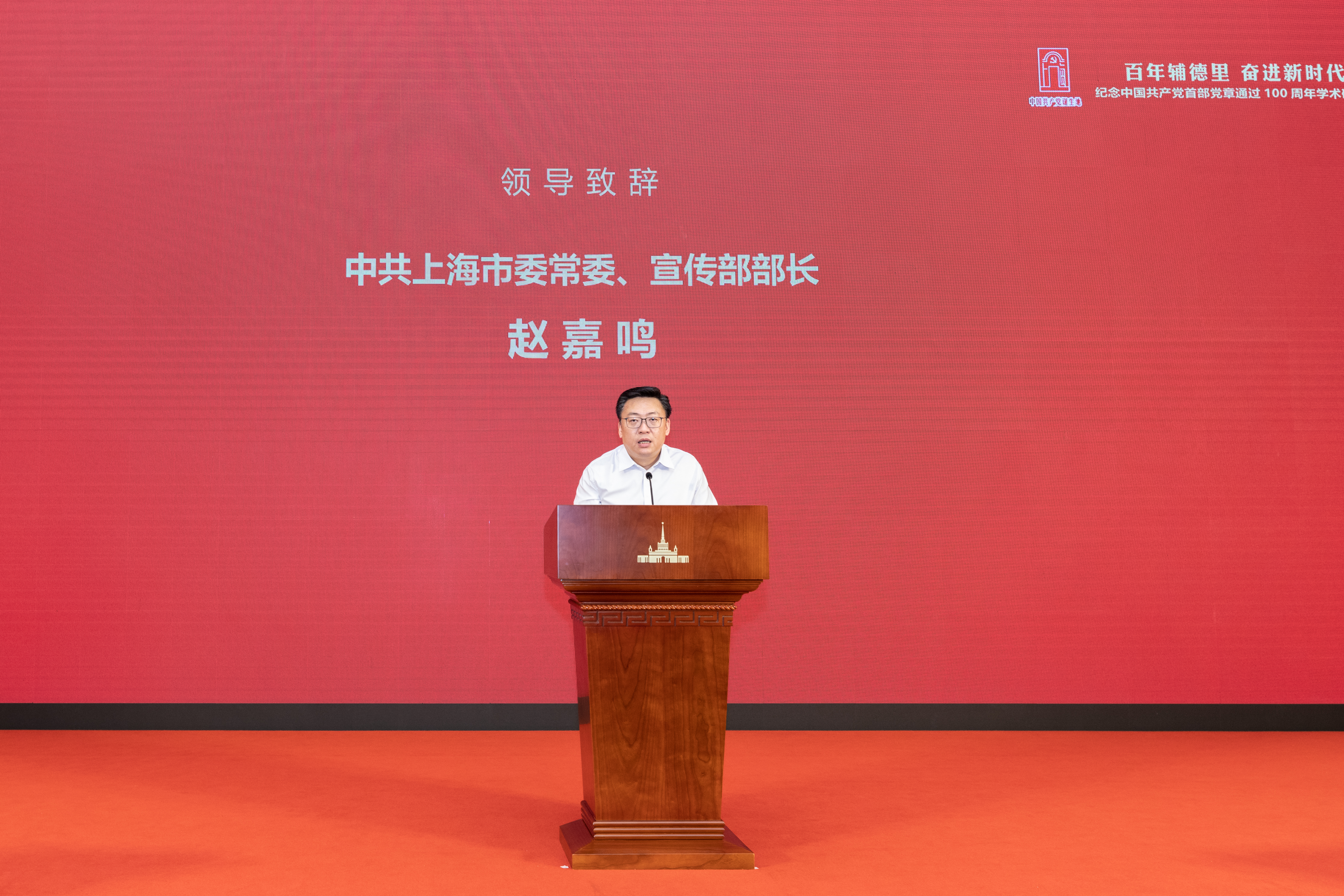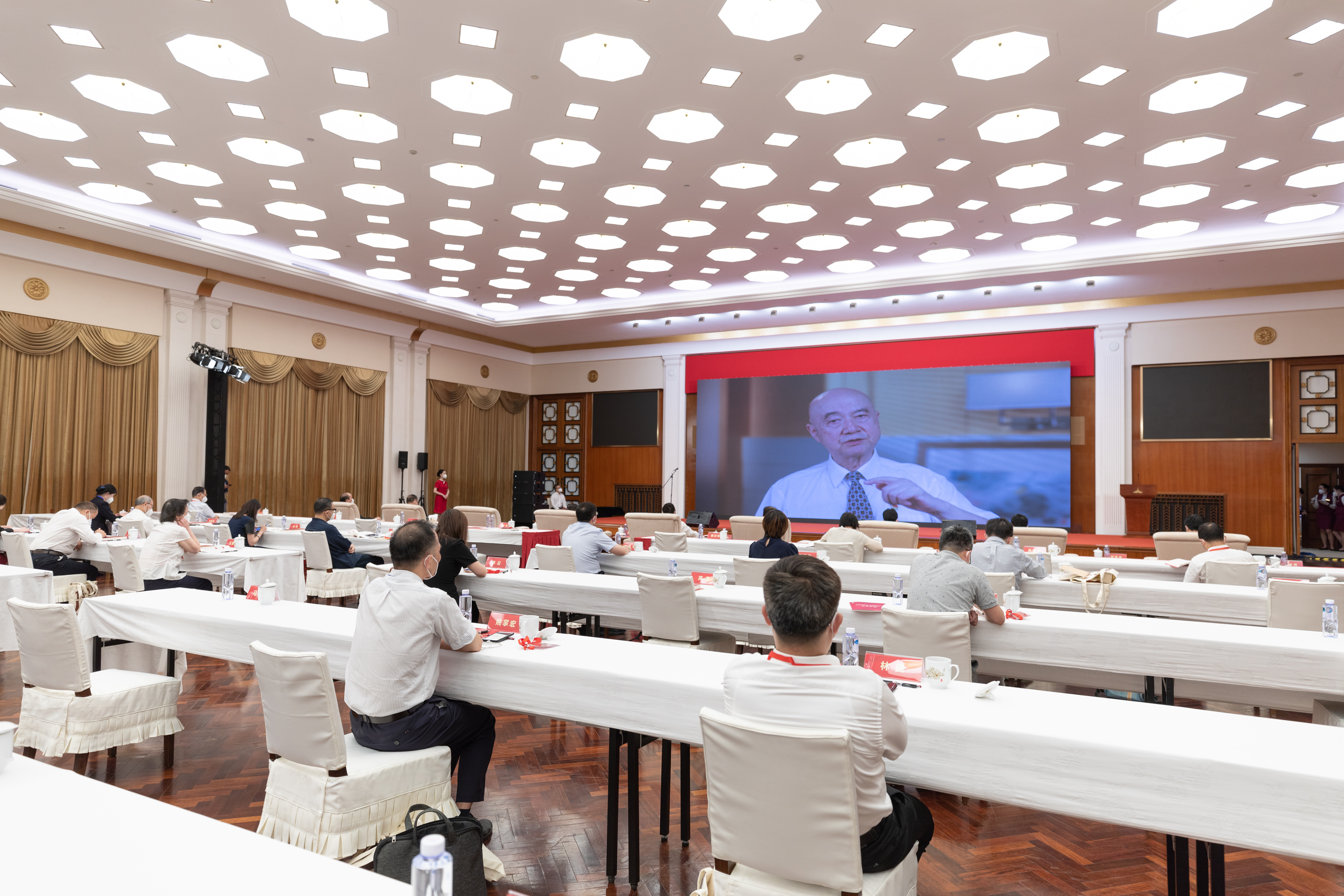Shanghai is the birthplace of the Communist Party of China (CPC), of the original aspiration, of the great founding spirit of the Party, and of the first Party Constitution. From July 16 to July 23, 1922, the Second National Congress of the CPC was held in Shanghai, which discussed and adopted the first Party Constitution in the history of the Party.
The CPC General Secretary Xi Jinping said, “Nothing can be accomplished without norms or standards. The Party Constitution is the fundamental constraining force of the Party and the general rule that the whole Party must follow.” From the Second National Congress of the CPC to the 19th National Congress of the CPC, the content of the Party Constitution has been revised and updated 17 times, but what remains unchanged is its stance oriented to the people and original aspiration.
The Party Constitution is inscribed with a revolutionary legacy. On the afternoon of July 23, an academic symposium entitled “Remembering Century-old Fudeli and Forging Ahead in the New Era” to commemorate the 100th anniversary of the adoption of the Party Constitution was held in Jing’an District, Shanghai, for the purpose of thoroughly studying and implementing General Secretary Xi Jinping’s important statement on the Party Constitution, practicing the spirit of the 12th Party congress, and carrying forward the great founding spirit of the Party.

Zhao Jiaming, Member of the Standing Committee of the CPC Shanghai Municipal Committee and Director of the Publicity Department of the CPC Shanghai Municipal Committee, attended the symposium and delivered a speech. Other participating guests included Pan Min, Deputy Director of the Publicity Department of the CPC Shanghai Municipal Committee and Director of Shanghai Municipal Committee Office for the Construction of Spiritual Civilization, Yan Aiyun, Director of the Party History Research Office of the CPC Shanghai Municipal Committee and Deputy Director of the Administration Committee of the Sites of the First, Second, and Fourth National Congresses of the CPC, and Yu Yong, Secretary of the CPC Jing’an District Committee.
Online or on-site keynote speeches were made by Ji Xiaohua, Deputy Director of the Seventh Research Department of the CPC Central Party History and Literature Research Institute, Yu Yong, Secretary of the CPC Jing’an District Committee, Xu Jiangang, Managing Vice President of the Party School of the CPC Shanghai Municipal Committee and Deputy Director of Shanghai Research Center for the Great Founding Spirit of the Communist Party of China, and Chen Changpu, granddaughter of Chen Duxiu (one of the CPC founders), Former Director of Chen Duxiu Garden Management Office in Anqing, Anhui Province and Former Vice Chairwoman of Anqing Federation of Returned Overseas Chinese. The session of keynote speeches was chaired by Yan Aiyun.
Yu Yong said in his keynote speech that Jing’an, as the place where the Second National Congress of the CPC was held and the first Party Constitution was formulated, has been making the study and implementation of the Party Constitution the top requirement, and taking the Party Constitution as the fundamental basis for advancing the Party’s cause and strengthening Party building. Jing’an has unwaveringly acted in line with the Party Constitution.
The development course of Jing’an can be seen as the epitome of the Party’s great historical course of achieving one victory after another. Jing’an will more closely rally around the CPC Central Committee with Comrade Xi Jinping at its core, carry out work with the Party Constitution as the guiding principle, remain true to its original aspiration and keep its mission firmly in mind, and extensively implement the spirit of the 12th Party congress. Targeted at growing into a fine example in practicing new ideas, pursuing high-quality development, manifesting soft power, and constructing a city of the people, Jing’an will work hard steadfastly to yield outcomes that make it live up to its reputation as the birthplace of the first Party Constitution, thus playing its part in developing Shanghai into a modern socialist international metropolis with world influence and setting the stage for the convening of the 20th National Congress of the CPC.

During the sessions of the keynote speeches and academic exchanges, nearly 50 experts and scholars from all over China had online and offline exchanges around the theme of discussion topics, reviewing the first Party Constitution adopted at the Second National Congress of the CPC, and jointly discussing the important position of the Second National Congress of the CPC in the Party’s development history and its far-reaching influence on Party building.
In his theme speech, Shao Weizheng, an expert in CPC history, a professor with first-class professional technology, and a major general, introduced “five firsts” of the Second National Congress of the CPC to expound on the outstanding contribution of the Congress to the great cause of the founding of the Party. And the Second National Congress of the CPC accomplishing the founding mission of the CPC together with the First National Congress of the CPC is an important milestone in the history of the founding of the CPC.
Li Qi, Director of the Shanghai Institute of Reform, Innovation and Development Strategy and Distinguished Research Fellow at the Shanghai Research Center for the Great Founding Spirit of the Communist Party of China, profoundly analyzed the historical contribution of the Second National Congress of the CPC to the formation of the great founding spirit of the Party from the perspectives of Party members’ ideals, beliefs, original aspirations, fighting spirit, and political character indicated in the first Party Constitution and Articles of Association. His speech provided important inspiration for an in-depth understanding of the great founding spirit of the Party.
Xin Ping, President of Shanghai Society of History of Communist Party of China and Distinguished Research Fellow at the Shanghai Research Center for the Great Founding Spirit of the Communist Party of China, gave his interpretation from the dimension of “self-revolution” implicated in the first Party Constitution. He clarified the relationship between social revolution and self-revolution, explained that the Party promoted social revolution via self-revolution to form the great founding spirit of the Party, and analyzed the spiritual code of “Why can the Party make it”.
Wang Aihua, the granddaughter of Wang Jinmei, was invited to the academic symposium. She said excitedly that his grandfather Wang Jinmei was a representative of the first and second National Congresses of the CPC and a participant in the founding of the Party. “My grandfather’s generation of CPC members chose a difficult and dangerous road to liberate the working masses. As their descendants, we must firmly follow in their footsteps and build our country better.”
The symposium was guided by the Seventh Research Department of the CPC Central Party History and Literature Research Institute, the Publicity Department of CPC Shanghai Municipal Committee, the Party History Research Office of the CPC Shanghai Committee, and the CPC Jing’an District Committee, and hosted by the Shanghai Research Center for the Great Founding Spirit of the Communist Party of China, the Administration Committee of the Sites of the First, Second, and Fourth National Congresses of the CPC, and the Publicity Department of the CPC Jing’an District Committee.